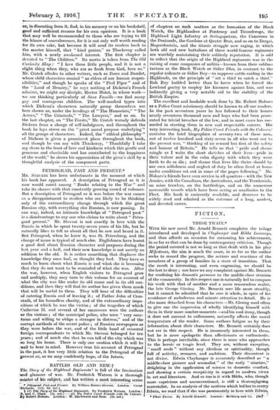PETROGRAD, PAST AND PRESENT.*
Ma. SrEVEINI has been unfortunate in the moment at which his book has appeared. A description of Petrograd as it is now would count among " Books relating to the War " and take its chance with that constantly growing crowd of volumes. But a description of Petrograd as it was before the war comes as a disappointment to readers who are likely to be thinking only of the extraordinary change through which the great Russian city, with everything else Russian, is now passing. In one way, indeed, an intimate knowledge of " Petrograd past " is a. disadvantage to any one who claims to write about " Petro- grad present." Mr. Steveni is not exactly in love with the Russia in which he spent twenty-seven years of his life, but he naturally likes to tell us about all that he saw and heard in it. But Petrograd, when he knew it, was St. Petersburg, and the change of name is typical of much else. Englishmen have learnt a good deal about Russian character and purposes during the last year and a half, and their new knowledge is not merely an addition to the old. It is rather something that displaces the knowledge they once had, or thought they had. They have so much to learn about what Russia is and what- she is becoming that they do not want to be reminded of what she was. After the war, however, when English visitors to Petrograd grow and multiply, they may turn to this volume for an account of what the city was like under its old name and in its old con- ditions, and then they will find its author has given them much that will be useful to them. They will hear of the difficulties of entering Russia and of leaving it ; of Father John of Cron- stadt, of his boundless charity, and of the extraordinary impo- sitions of which he was the victim ; of the tragedies of which Catherine IL and several of her successors were the authors or the victims ; of the municipal police, who were " very cour- _teoua and willing to oblige a stranger in distress," and of the corrupt methods of the secret police ; of Russian newspapers as they were before the war, and of the little band of censored foreign correspondents to which Mr. Steveni belonged for ten years; and of much else that he can tell of the city which was so long his home. There is only one caution which it will be .well to bear in mind. However true his account of Petrograd in the past, it has very little relation to the Petrograd of the „present or, as we may confidently hope, of the future.


































 Previous page
Previous page